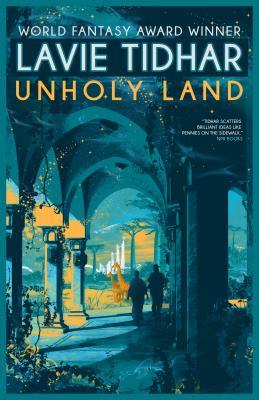When Lior Tirosh, a writer of pulpy science fiction detective stories, returns from Berlin to his home Palenstina, a Jewish country in central Africa, weird things start to happen. Lior forgets details of his life, people around him find some of his actions perplexing, and he takes on a missing persons case to search for a niece he doesn’t know.
I love the slow, surreal unraveling of Unholy Land, both in terms of plot and genre. Without quite realizing it himself, Lior transitions from writer to detective, from an uneventful life to one filled with murder and intrigue, narrowly escaping multiple factions who want him dead. Then, it’s not just Lior’s memories that slip away, but reality itself, as Lior finds he can travel through alternate realities.
Author Lavie Tidhar’s relationship with Tirosh reminds me of Kurt Vonnegut’s complicated relationship with his own fictional character Kilgore Trout. Tirosh mentions some of the books he’s written, including Central Station, Osama, and even Unholy Land, books which in our world were written by Tidhar. Tirosh feels he is a character is one of his own novels. Tidhar blurs the lines between realities both within the book, but he keeps the possibility open that he is also Tirosh.
The alternate history includes a Palestina in conflict with it’s neighboring state of Uganda, even going so far as to build a wall to keep out refugees and terrorists. The Nazi regime is alive and well, but the Jews settled in Africa well before their rise to power.
At first blush the plot seems over-the-top and action-packed, and it is at times. But at its heart, the novel is slow and subtle and abstract and unnerving.
Thanks to Netgalley and Tachyon Publications for a free copy in exchange for an honest review!
